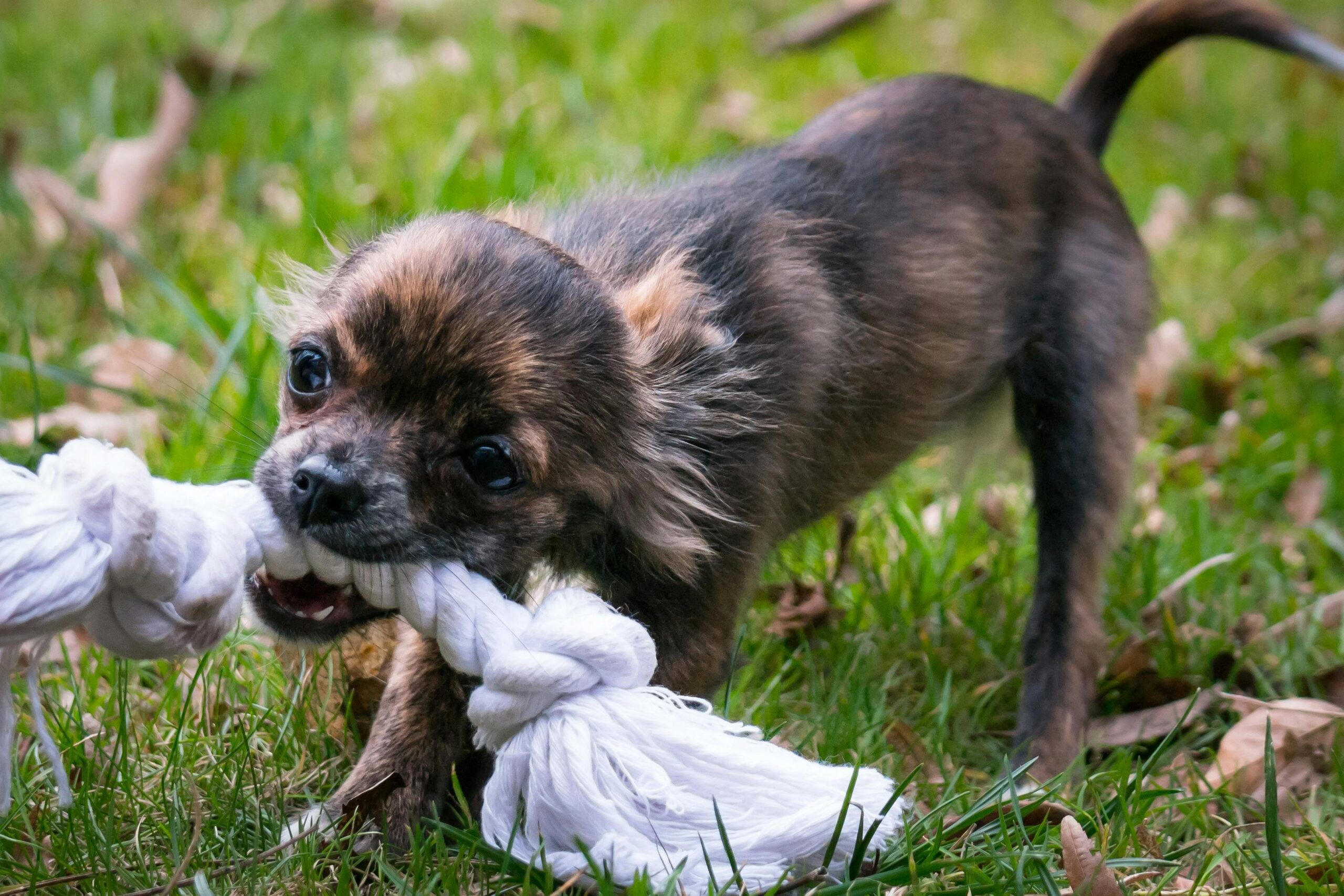Dental Care for Chihuahuas: Keeping Those Tiny Teeth Healthy

Chihuahuas, like all dogs, require consistent dental care to maintain their health and well-being. Their small mouths and tiny teeth make them particularly susceptible to dental issues, which can lead to discomfort, infections, and even more serious health problems if left untreated. Dental care for Chihuahuas involves not only daily maintenance but also proactive measures to prevent common issues like tooth decay and gum disease. By establishing a regular dental care routine and paying attention to warning signs, you can help your Chihuahua maintain a healthy smile and a longer, happier life.
In this article, we’ll cover essential steps to ensure your Chihuahua’s teeth stay clean and healthy. From understanding common dental problems to establishing a daily care routine, you’ll learn how to keep those tiny teeth in tip-top shape.
1. Understanding Chihuahua Dental Issues
Chihuahuas are prone to several dental problems due to their small mouths and crowded teeth. Being aware of these potential issues can help you take early action to prevent them from becoming more serious. Dental health plays a critical role in your Chihuahua’s overall well-being, and untreated problems can lead to more than just a sore mouth—they can affect your dog’s entire body.
1.1 Common Dental Problems in Chihuahuas
One of the most common dental problems in Chihuahuas is periodontal disease, which occurs when bacteria build up along the gumline, leading to infection, inflammation, and eventually tooth loss if left untreated. Due to their small jaws, Chihuahuas often have crowded teeth, which makes it easier for food particles and plaque to accumulate between teeth, promoting bacterial growth.
Tooth decay is another frequent issue in Chihuahuas. The small size of their teeth makes them more vulnerable to cavities and fractures. As plaque builds up, it hardens into tartar, which can damage the tooth enamel and lead to painful infections or abscesses. Over time, if decay is not addressed, the tooth may need to be removed to prevent further infection.
Overcrowding is another dental problem seen in Chihuahuas, especially if their baby teeth don’t fall out on time, leading to retained baby teeth. This can cause misalignment and create pockets where plaque builds up. It’s important to monitor your Chihuahua’s dental development to ensure that any lingering baby teeth are removed when necessary.
1.2 The Impact of Dental Problems on Overall Health
While dental issues may seem isolated to the mouth, they can have a far-reaching impact on your Chihuahua’s overall health. Periodontal disease, for example, not only causes pain and discomfort in the mouth but also can lead to bacteria entering the bloodstream. Once this happens, it can affect vital organs, leading to conditions such as heart disease, liver disease, and kidney problems.
A Chihuahua suffering from dental pain may also experience difficulty eating, which can lead to weight loss and malnutrition. This can further weaken their immune system, making them more susceptible to infections and other health problems. That’s why addressing dental health early is crucial—it’s not just about the teeth but about your dog’s entire well-being.
By maintaining good dental hygiene, you’re helping to prevent these secondary health issues and keeping your Chihuahua happy, healthy, and pain-free.
1.3 Signs Your Chihuahua May Have Dental Issues
Chihuahuas are small but mighty, often masking discomfort until the issue becomes severe. As an owner, it’s essential to watch for signs that your Chihuahua may be suffering from dental problems. One of the earliest and most common signs is bad breath, which is often an indication of bacteria buildup or gum disease. While a mild odor is normal, a strong, unpleasant smell should raise concern and prompt a vet visit.
Other signs include excessive drooling, pawing at the mouth, and difficulty eating. Your Chihuahua may chew more slowly, avoid hard food, or show reluctance to eat altogether if their teeth are bothering them. In more advanced cases, you might notice visible signs of dental issues, such as swollen or bleeding gums, discolored teeth, or even loose teeth.
If your Chihuahua displays any of these symptoms, it’s important to schedule a veterinary appointment promptly. Early intervention can help prevent further damage and restore your Chihuahua’s dental health before it leads to more serious complications.
2. Establishing a Dental Care Routine

Preventing dental problems in Chihuahuas starts with a good daily dental care routine. By taking small, consistent steps to care for their teeth, you can help avoid the common issues that plague this breed. Regular brushing, using dental chews, and scheduling veterinary checkups are all part of a comprehensive dental care plan that will keep your Chihuahua’s teeth healthy and their mouth pain-free.
2.1 Daily Brushing Techniques
Brushing your Chihuahua’s teeth daily is the best way to prevent plaque buildup, which leads to tartar and, ultimately, periodontal disease. Because Chihuahuas have small, crowded mouths, plaque can accumulate quickly, so brushing is essential to maintaining their dental health. It’s important to use a dog-specific toothbrush and toothpaste—human toothpaste contains ingredients that can be harmful to dogs.
To get started, introduce your Chihuahua to the toothbrush gradually, allowing them to sniff and explore it before attempting to brush. Begin by gently lifting their lips and brushing in small circular motions, focusing on the gum line where plaque tends to gather. Start slowly, brushing just a few teeth at a time, and gradually work your way up to brushing the entire mouth. The goal is to make brushing a positive experience, so offer plenty of praise and treats afterward.
For many Chihuahuas, daily brushing can seem daunting at first, but with patience and consistency, it becomes a routine part of their care. Even a few minutes each day can make a huge difference in preventing dental problems down the line.
2.2 Dental Chews and Toys
In addition to brushing, providing dental chews and toys designed to clean your Chihuahua’s teeth can help reduce plaque and tartar buildup. These chews are specifically formulated to help scrape away plaque while your dog chews, making them a useful tool for keeping teeth clean between brushings. Look for chews that are appropriate for small dogs and endorsed by veterinary dental associations for optimal effectiveness.
Toys that encourage chewing can also aid in maintaining oral hygiene. Hard rubber toys with ridges and textures are especially useful, as they can massage the gums and remove food particles from between the teeth. Always supervise your Chihuahua while they’re using dental chews or toys to ensure they don’t break off small pieces that could pose a choking hazard.
While dental chews and toys shouldn’t replace regular brushing, they are excellent supplements to help maintain your Chihuahua’s dental health.
2.3 Regular Vet Dental Checkups
Just like humans, Chihuahuas benefit from professional dental care. Scheduling regular veterinary checkups is crucial for maintaining their dental health, as veterinarians can catch issues that may be missed during daily care. Your vet will examine your Chihuahua’s teeth and gums, checking for signs of infection, tooth decay, and other issues. If necessary, they may recommend a professional dental cleaning, which involves scaling the teeth to remove tartar buildup.
Professional cleanings are typically done under anesthesia to ensure the dog is comfortable and the procedure is thorough. These cleanings are especially important for Chihuahuas, as they are prone to developing tartar, even with regular brushing at home. Depending on your Chihuahua’s dental health, your vet may recommend cleanings once a year or more frequently if necessary.
3. Diet and Its Role in Dental Health

Diet plays a significant role in your Chihuahua’s dental health. The right food choices can help maintain healthy teeth, while the wrong ones can contribute to plaque buildup and tooth decay. In addition to a balanced diet that supports overall health, focusing on foods and treats that promote clean teeth can be a simple yet effective way to maintain your Chihuahua’s oral hygiene.
3.1 Choosing the Right Food
The type of food you feed your Chihuahua has a direct impact on their dental health. Dry kibble, for example, is generally better for maintaining clean teeth than wet food because it encourages chewing, which helps scrape away plaque. The crunchy texture of dry food acts as a natural abrasive, cleaning the teeth as your dog eats.
However, it’s essential to choose a high-quality dry food specifically formulated for small breeds like Chihuahuas. The kibble size should be small enough for their tiny mouths, ensuring that your Chihuahua can chew it properly. Wet food, while easier to eat, can stick to teeth and contribute to the development of plaque and tartar. If you do feed your Chihuahua wet food, it’s important to be even more diligent about brushing and dental chews to prevent buildup.
3.2 Healthy Snacks for Clean Teeth
In addition to their regular meals, providing your Chihuahua with healthy snacks that promote dental health can be beneficial. Certain fruits and vegetables, such as carrots and apples, can act as natural teeth cleaners. These snacks not only provide a low-calorie treat but also help remove food particles and plaque as your dog chews.
Other natural options include raw bones (supervised) or specially formulated dental treats. However, always be cautious about the size and hardness of these snacks to prevent choking or dental fractures. Treats that are too hard can damage a Chihuahua’s small teeth, so it’s important to select appropriate options that clean without causing harm.
3.3 Avoiding Harmful Foods
Some foods can be detrimental to your Chihuahua’s dental health, particularly those that are high in sugar or carbohydrates. Sugary treats, while tempting to give, can lead to rapid plaque buildup and tooth decay. Similarly, soft or sticky foods, such as chewy snacks or table scraps, can become lodged between the teeth, contributing to bacterial growth and tartar formation.
Additionally, avoid giving your Chihuahua bones that are too hard, as these can crack their teeth, leading to painful injuries and expensive dental procedures. Stick to healthy, vet-approved foods and treats to keep your dog’s teeth in the best possible shape.
4. Preventing and Treating Dental Diseases

Preventing dental disease in Chihuahuas requires a proactive approach that includes daily care, professional checkups, and addressing any issues as soon as they arise. With their susceptibility to dental problems, it’s important to be aware of the steps you can take to prevent serious conditions like periodontal disease and how to manage problems like tooth loss if they occur.
4.1 Preventing Periodontal Disease
Periodontal disease is one of the most common dental issues in Chihuahuas and can lead to serious complications if left untreated. The best way to prevent periodontal disease is through consistent dental care, including daily brushing, regular use of dental chews, and annual vet checkups.
Periodontal disease starts when plaque builds up along the gumline, causing inflammation and infection. Over time, the infection can lead to tooth loss and damage to the jawbone. By brushing your Chihuahua’s teeth daily and providing them with chew toys that help clean their teeth, you can significantly reduce the risk of this disease.
4.2 Managing Tooth Loss
As Chihuahuas age, they may begin to lose teeth due to periodontal disease or other dental problems. Tooth loss is common in small breeds, but it can affect your Chihuahua’s ability to eat and maintain their quality of life. If your Chihuahua loses teeth, it’s important to adjust their diet to accommodate their changing needs. Softer foods, such as wet food or softened kibble, may be necessary to ensure your dog can still eat comfortably.
In some cases, your vet may recommend extracting damaged teeth to prevent further infection or discomfort. Regular checkups can help identify loose or damaged teeth early, allowing you to manage the situation before it becomes painful for your Chihuahua.
4.3 Dealing with Bad Breath
Bad breath, or halitosis, is often one of the first signs of dental disease in Chihuahuas. While mild bad breath is normal, a strong, unpleasant odor could indicate underlying issues such as plaque buildup, gum disease, or tooth decay. Regular brushing, dental chews, and a healthy diet can help reduce bad breath. If the problem persists despite regular care, a visit to the vet is necessary to check for more serious issues like infection or disease.
In some cases, persistent bad breath may be a sign of gastrointestinal issues or other health concerns, so it’s essential to address it promptly with professional care.
Conclusion
Maintaining your Chihuahua’s dental health is essential for their overall well-being. By understanding the common dental issues that affect this breed, establishing a daily care routine, providing a balanced diet, and addressing problems early, you can help your Chihuahua avoid painful dental conditions and live a healthier, happier life. Regular brushing, the right food, and professional checkups are key to keeping your Chihuahua’s tiny teeth healthy and strong.
With consistent care and attention, you can prevent the common dental problems that Chihuahuas face and ensure that your furry friend’s smile stays bright for years to come.






